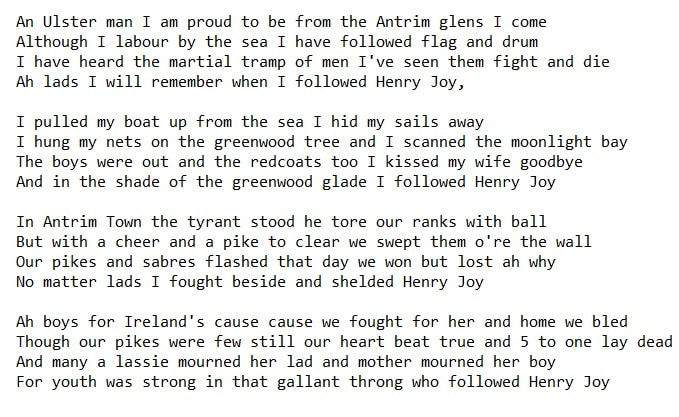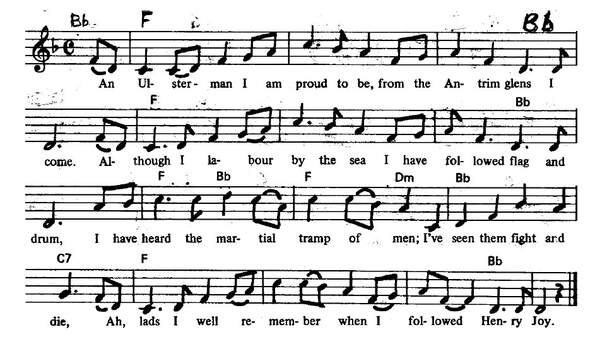Henry Joy Lyrics And Guitar Chords
The sheet music is included.This old ballad relates to the 1798 rebellion in Ireland Henry Joy McCracken joined the United Irishmen in 1775 and was arrested the following year and spent 15 months in Kilmainham prison Dublin.After his release he became general of the forces that attacked Antrim Town,he was captured and tried for treason and was hanged the same day in Belfast 17 July 1798, song recorded by The Wolfe Tones and by The Dubliners. The video is of The Flying Column who also covered another ballad from the 1798 rising , '' Boolavogue Song ''.
The Croppy Boy Song is another ballad from the same time in Ireland's history. The ballad was also sang by The Irish Rovers and the band, Athenry.
The Croppy Boy Song is another ballad from the same time in Ireland's history. The ballad was also sang by The Irish Rovers and the band, Athenry.
Henry Joy Song Words With Chords In G Major
An[G] Ulster man I am proud to be from the[C] Antrim glens I[D7] come
Al[G]though I labour by the sea I have followed[C] flag and drum
I have[G] heard the[C] martial[G] tramp of[Em] men I've [C]seen them fight and[D7] die
Ah[G] lads I will remember when I followed[C] Henry Joy,,[G]
I pulled my boat up from the sea I hid my sails away
I hung my nets on the greenwood tree and I scanned the moonlight bay
The boys were out and the redcoats too I kissed my wife goodbye
And in the shade of the greenwood glade I followed Henry Joy
In Antrim Town the tyrant stood he tore our ranks with ball
But with a cheer and a pike to clear we swept them o're the wall
Our pikes and sabres flashed that day we won but lost ah why
No matter lads I fought beside and shelded Henry Joy
Ah boys for Ireland's cause cause we fought for her and home we bled
Though our pikes were few still our heart beat true and 5 to one lay dead
And many a lassie mourned her lad and mother mourned her boy
For youth was strong in that gallant throng who followed Henry Joy
An[G] Ulster man I am proud to be from the[C] Antrim glens I[D7] come
Al[G]though I labour by the sea I have followed[C] flag and drum
I have[G] heard the[C] martial[G] tramp of[Em] men I've [C]seen them fight and[D7] die
Ah[G] lads I will remember when I followed[C] Henry Joy,,[G]
I pulled my boat up from the sea I hid my sails away
I hung my nets on the greenwood tree and I scanned the moonlight bay
The boys were out and the redcoats too I kissed my wife goodbye
And in the shade of the greenwood glade I followed Henry Joy
In Antrim Town the tyrant stood he tore our ranks with ball
But with a cheer and a pike to clear we swept them o're the wall
Our pikes and sabres flashed that day we won but lost ah why
No matter lads I fought beside and shelded Henry Joy
Ah boys for Ireland's cause cause we fought for her and home we bled
Though our pikes were few still our heart beat true and 5 to one lay dead
And many a lassie mourned her lad and mother mourned her boy
For youth was strong in that gallant throng who followed Henry Joy
Henry Joy Guitar chords in the key of D.
An[D] Ulster man I am proud to be from the[G] Antrim glens I[A7] come
Al[D]though I labour by the sea I have followed[G] flag and drum
I have[D] heard the[G] martial[D] tramp of[Bm] men I've [G]seen them fight and[A7] die
Ah[D] lads I will remember when I followed[G] Henry Joy,,[D].
Guitar chords in the key of C.
An[C] Ulster man I am proud to be from the[F] Antrim glens I[G7] come
Al[C]though I labour by the sea I have followed[F] flag and drum
I have[C] heard the[F] martial[C] tramp of[Am] men I've [F]seen them fight and[G7] die
Ah[C] lads I will remember when I followed[F] Henry Joy,,[C]
Irish song lyrics G-J
An[D] Ulster man I am proud to be from the[G] Antrim glens I[A7] come
Al[D]though I labour by the sea I have followed[G] flag and drum
I have[D] heard the[G] martial[D] tramp of[Bm] men I've [G]seen them fight and[A7] die
Ah[D] lads I will remember when I followed[G] Henry Joy,,[D].
Guitar chords in the key of C.
An[C] Ulster man I am proud to be from the[F] Antrim glens I[G7] come
Al[C]though I labour by the sea I have followed[F] flag and drum
I have[C] heard the[F] martial[C] tramp of[Am] men I've [F]seen them fight and[G7] die
Ah[C] lads I will remember when I followed[F] Henry Joy,,[C]
Irish song lyrics G-J
Below is the sheet music for Henry Joy



